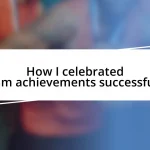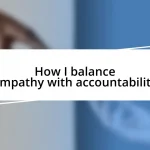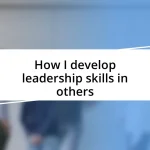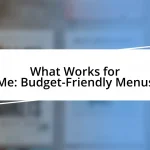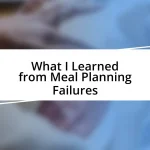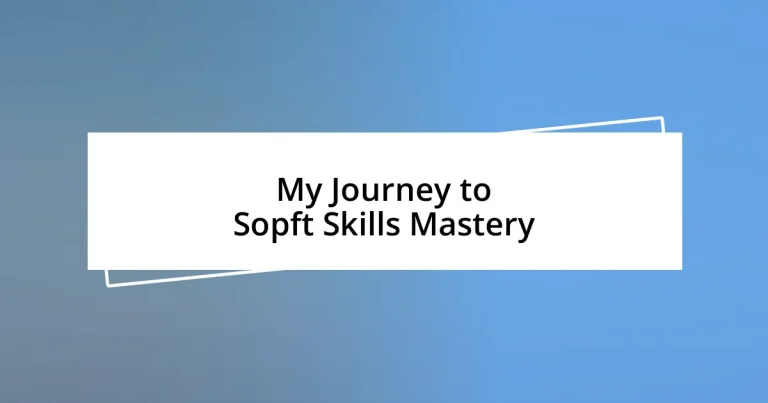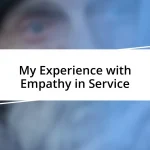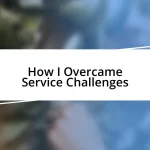Key takeaways:
- Soft skills, like effective communication and empathy, enhance collaboration and improve interpersonal dynamics, both at work and in personal life.
- Identifying personal soft skills gaps through self-reflection and feedback can lead to meaningful growth and enriched relationships.
- Practical techniques such as role-playing, mindfulness, and journaling are effective for improving soft skills and managing emotions during challenging interactions.
- Celebrating team achievements and embracing diverse perspectives can foster a supportive team environment and drive creativity in problem-solving.
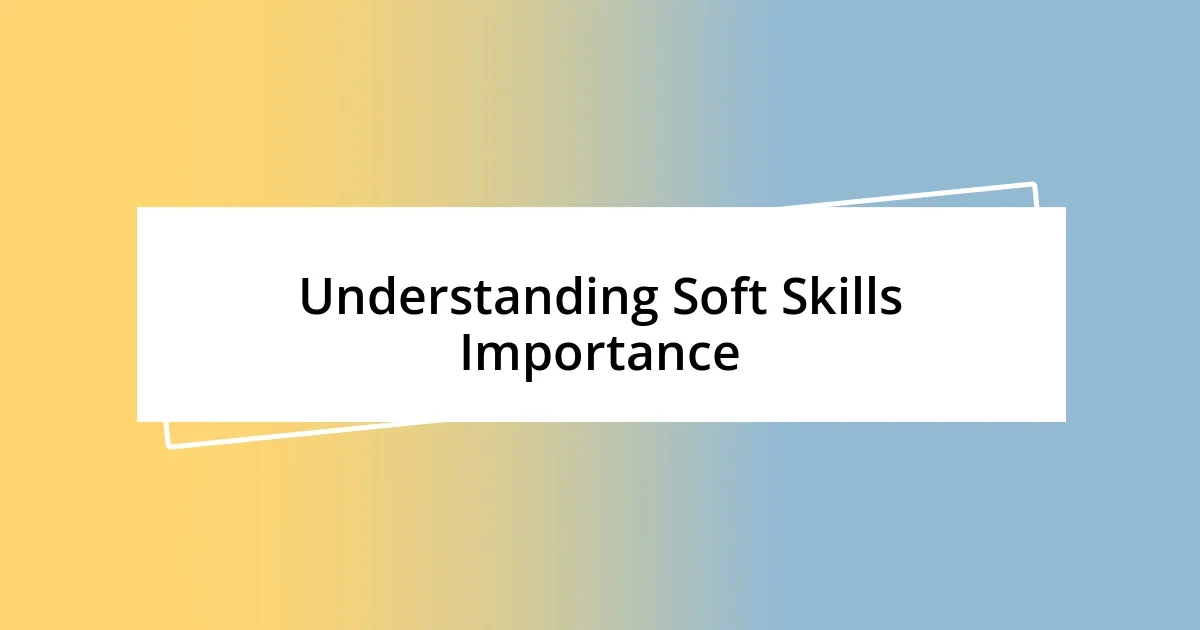
Understanding Soft Skills Importance
Soft skills are often the secret sauce that can elevate a professional from good to great. I remember a time when I was collaborating on a project that required not just technical knowledge but also the ability to navigate interpersonal dynamics. It was incredible to see how effective communication and empathy turned a group of individuals into a cohesive team, achieving far more than any one of us could alone. Have you ever noticed how much smoother a project goes when everyone collaborates well?
I’ve personally found that understanding soft skills is not just about improving my job performance; it’s about enriching my interactions with people in every area of life. One day, during a heated discussion at work, I realized that my ability to actively listen completely transformed the energy of the conversation. Instead of escalating tensions, my simple act of listening opened doors to solutions and understanding. Isn’t it fascinating how small shifts in our behavior can lead to profound changes in outcomes?
Furthermore, the importance of soft skills extends beyond the workplace. They shape the quality of our relationships and boost our resilience in life’s challenges. I once struggled with a difficult personal situation, and it was my emotional intelligence that helped me connect with others in similar states. This not only provided me with support but also taught me the profound impact of vulnerability and openness. Have you experienced a moment where your ability to empathize made a significant difference? It’s these moments that truly highlight the value of mastering soft skills.
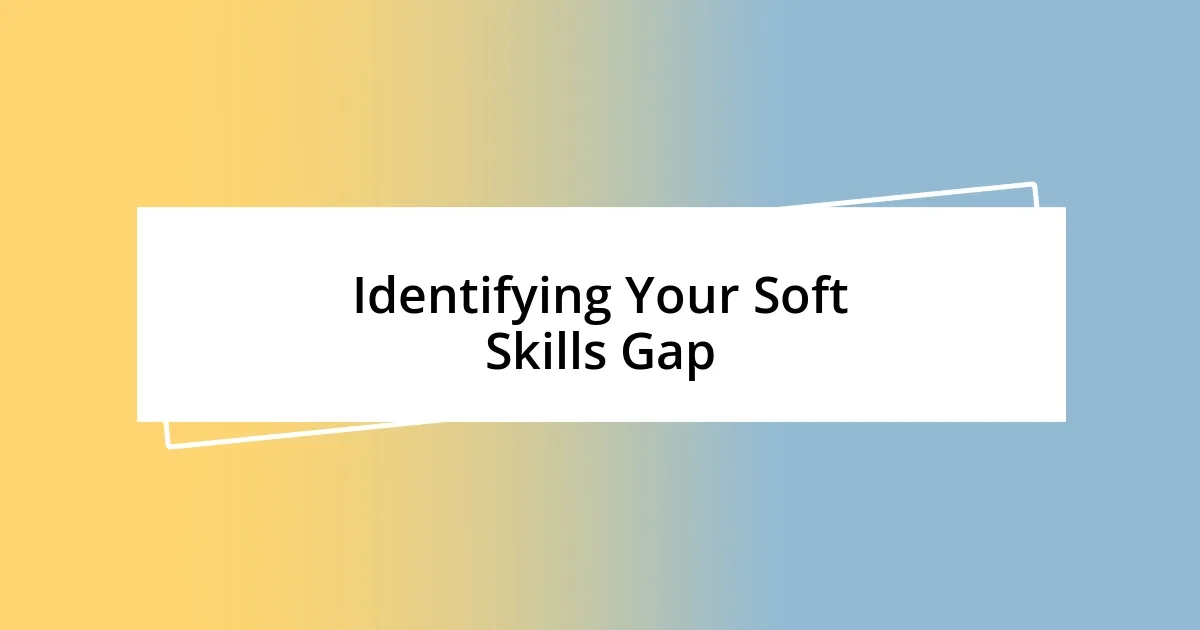
Identifying Your Soft Skills Gap
Identifying your soft skills gap can be a revealing experience. I remember when I first conducted a personal skills assessment, and it felt like looking in a mirror. I discovered that while I excelled in teamwork, my conflict resolution skills needed work. This realization pushed me to actively seek feedback and learn how I could handle disagreements more constructively.
To help you pinpoint your own soft skills gap, consider these key points:
- Self-reflection: Set aside time to think about your interactions. Are there recurring challenges?
- Feedback from others: Ask friends or colleagues to share their insights on your interpersonal skills.
- Set specific goals: Identify areas you want to improve and create a plan to develop them.
- Observe role models: Notice how effective communicators handle various situations and learn from them.
- Practice emotional awareness: Pay attention to your feelings in different contexts and how they affect your reactions.
This clarity not only enhances personal growth but also enriches your relationships with those around you. Each step I took in this process enriched my interactions and boosted my confidence, especially in challenging conversations. Have you experienced that eureka moment when you realize what you’re missing? It’s an exhilarating path to self-discovery that can lead to meaningful change.
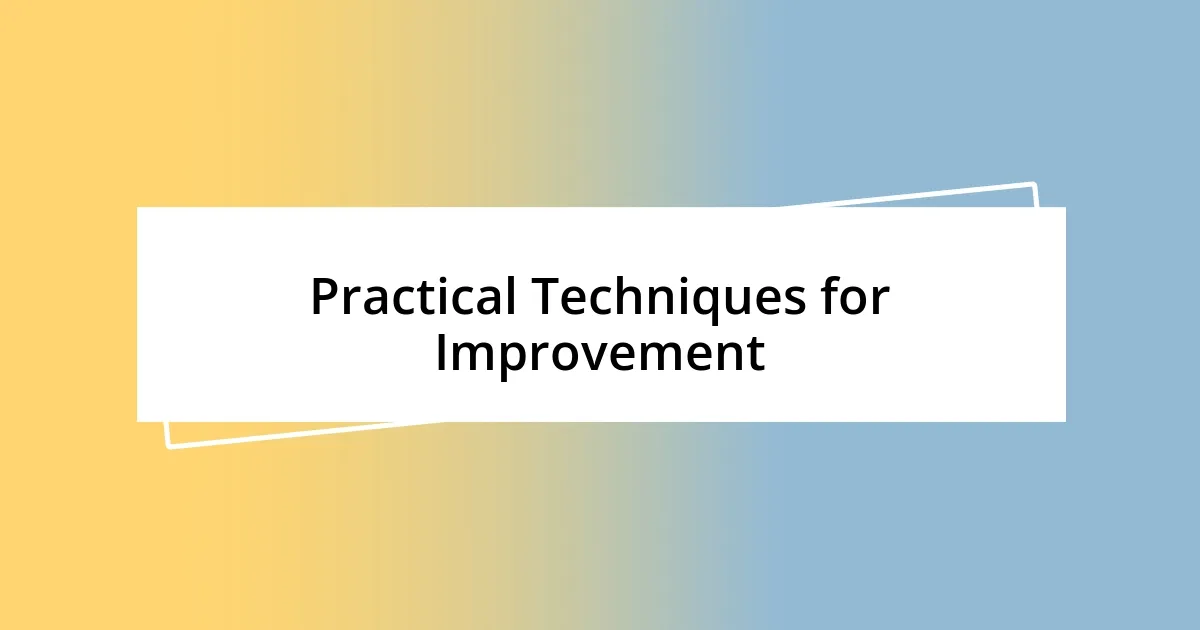
Practical Techniques for Improvement
When it comes to improving soft skills, one practical technique I found effective is role-playing. I remember a time when my colleague and I took turns practicing difficult conversations, like giving feedback and resolving conflicts. This playful approach not only made the process enjoyable but also allowed us to gain valuable insights into our communication styles. Have you ever tried this with a friend or a teammate?
Another technique that has greatly benefited my journey is mindfulness. By being present and aware during conversations, I’ve noticed that I better manage my reactions and understand others’ emotions. A simple breathing exercise before a tough discussion can help center my thoughts and prepare me to listen actively. This practice has made an incredible difference in my interactions. How often do we rush into conversations without being mentally prepared?
Lastly, I’ve found journaling to be a powerful tool for reflection and improvement. Writing about my interactions after they happen allows me to analyze what went well and where I can improve. For example, I often jot down my feelings and responses from a meeting, noting what I could have done differently. This not only tracks my progress but also deepens my understanding of my emotional triggers and how to manage them more effectively.
| Technique | Description |
|---|---|
| Role-playing | Practicing difficult conversations with a partner to find new ways to communicate. |
| Mindfulness | Focusing on present moment awareness to enhance listening and emotional regulation. |
| Journaling | Reflecting on past interactions to identify strengths and areas for growth. |
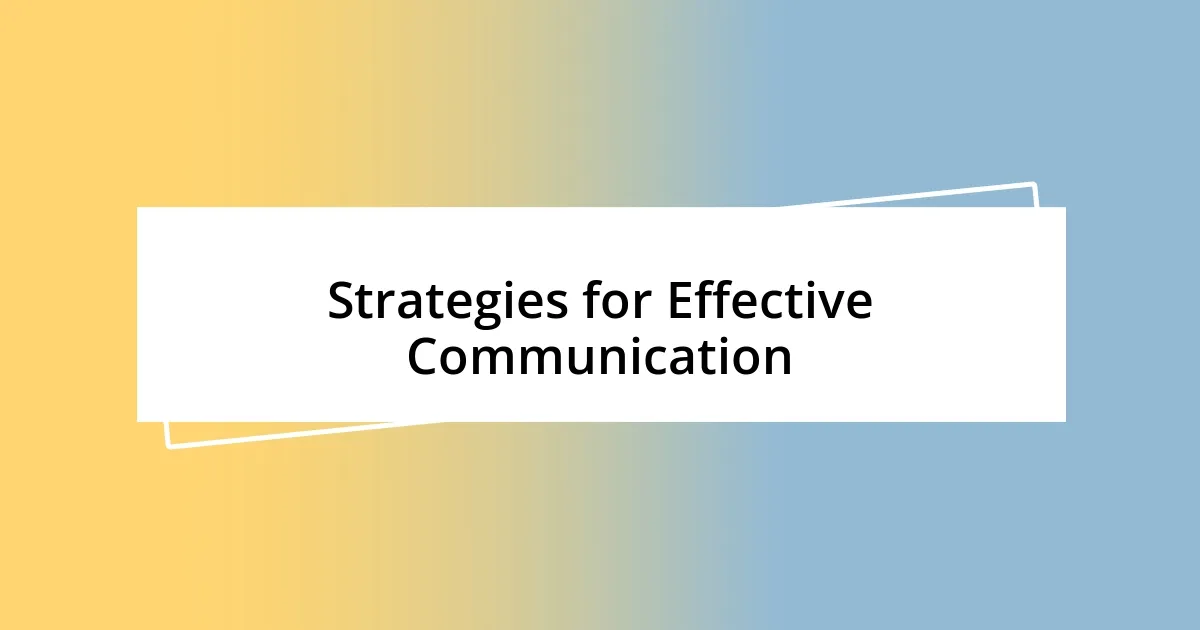
Strategies for Effective Communication
One strategy that has profoundly shaped my communication skills is active listening. In a group discussion, I once found that simply nodding or saying “uh-huh” wasn’t really enough. When I focused on what my colleagues were saying—repeating back their key points or asking clarifying questions—I noticed how it transformed the dialogue. It made others feel valued and encouraged them to open up more. Have you ever noticed how people respond positively when they feel heard?
Another effective approach I’ve embraced is using simple, clear language. I remember drafting emails that were filled with jargon, thinking it made me sound knowledgeable. However, I soon realized that clarity often trumps complexity. When I switched to straightforward language, I received quicker responses and fewer misunderstandings. It’s surprising how much more effective communication can become when we strip away the fluff. Have you ever had a situation where simple wording made all the difference in understanding?
Lastly, I’ve learned the importance of maintaining a positive tone, even in challenging conversations. I once had a difficult call with a client who was frustrated. Instead of mirroring their negativity, I consciously smiled and adopted an upbeat tone, which gradually shifted the mood of the discussion. This taught me that our tone can influence the entire interaction. Have you noticed how infectious a positive vibe can be during tough discussions? It’s amazing how much I’ve grown through these experiences—seeing them not merely as obstacles but as opportunities to connect and learn from others.
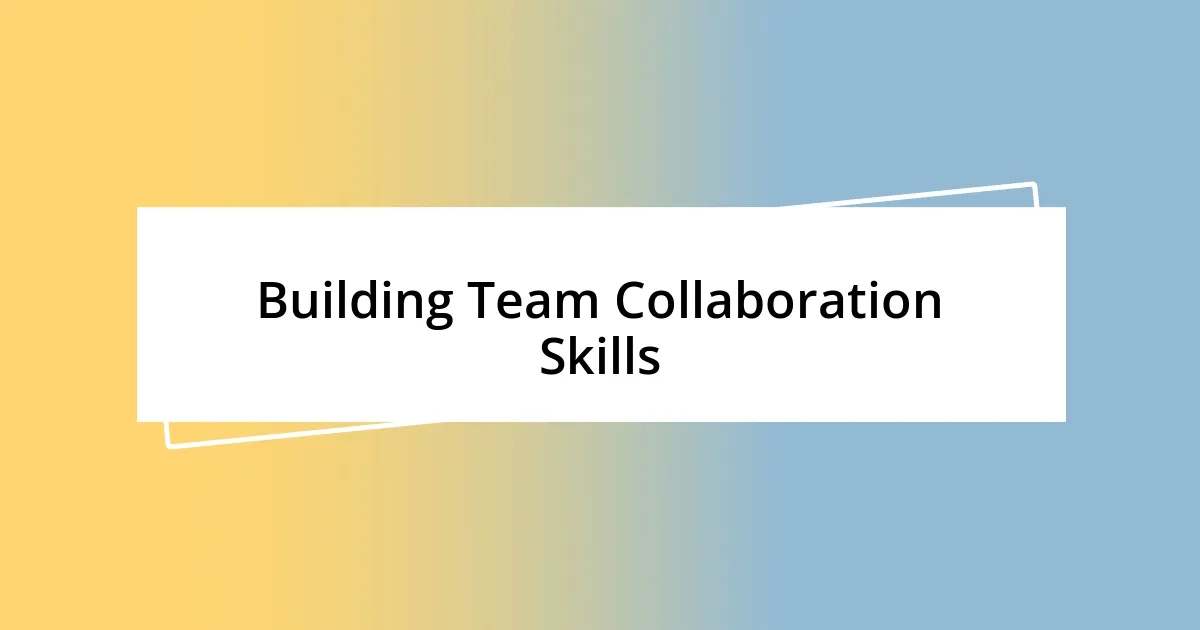
Building Team Collaboration Skills
Building team collaboration skills has truly been a journey for me. I recall a project where we were faced with a tight deadline, and it became evident that open communication was crucial. We organized daily stand-up meetings, where each team member shared their progress and any roadblocks. This transparency not only fostered a sense of accountability but also built trust among us. Have you ever seen how sharing challenges as a team can create a supportive environment?
In my experience, harnessing diverse perspectives often leads to creative breakthroughs. During one brainstorming session, I encouraged different viewpoints by implementing a “yes, and…” approach, where everyone added to each other’s ideas instead of shutting them down. This small shift in mindset not only made everyone feel heard but sparked innovative solutions we hadn’t considered before. How often do you actively seek input from every team member to enrich the conversation?
Another aspect I’ve focused on is recognizing and celebrating team achievements, no matter how small. I remember a time when we completed a challenging phase of a project, and I suggested we take a moment to acknowledge our hard work. We shared our successes over lunch, reflecting on what we learned and how we could carry that energy forward. This practice has not only strengthened our bond but also motivated us to continue pushing boundaries together. When was the last time you celebrated a team win, and how did it feel?
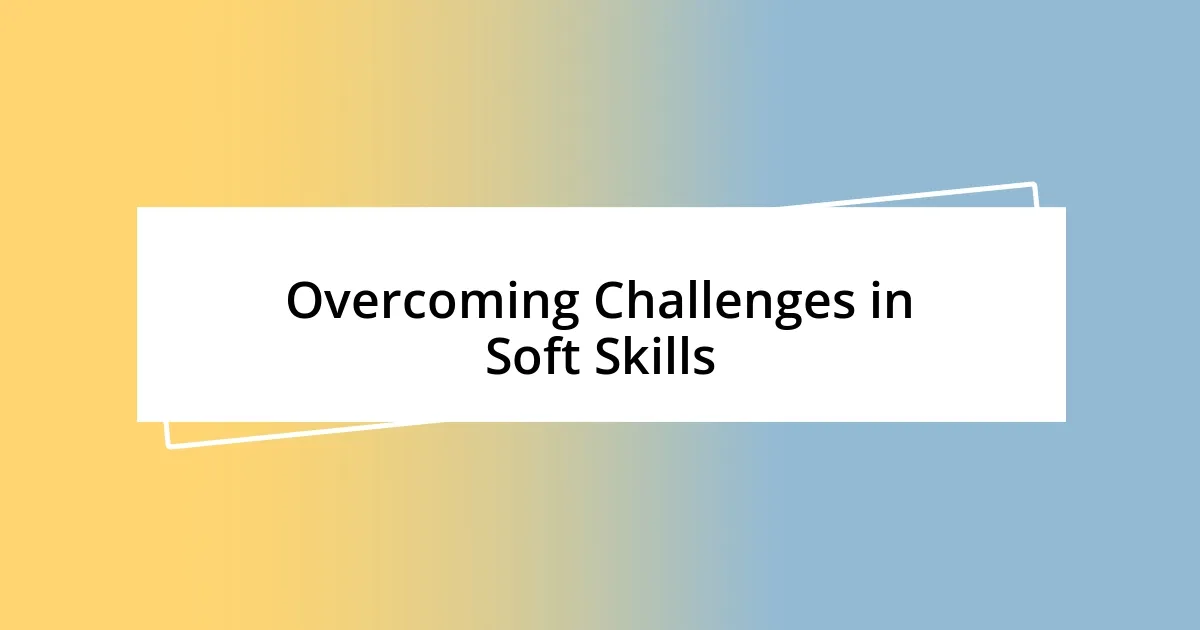
Overcoming Challenges in Soft Skills
I’ve faced my fair share of challenges in mastering soft skills, particularly when it comes to giving and receiving feedback. I can remember a time when I hesitated to voice my thoughts during a peer review session, fearing backlash. The breakthrough came when I embraced the idea that feedback is a gift. I started framing my comments with empathy, focusing on growth rather than criticism. Have you ever found that changing your perspective can make conversations significantly easier?
Another hurdle I encountered was dealing with conflicts. I used to shy away from disagreements, thinking that avoiding conflict would keep the peace. Yet, I learned that addressing issues directly can lead to stronger relationships. I recall a disagreement with a colleague that was resolved not by avoidance, but through an open dialogue over coffee. I expressed my concerns and listened to their side as well. What I’ve realized is that navigating these tough conversations can yield unexpected trust and clarity.
Managing stress in communication has also been a critical challenge for me. During high-pressure situations, I’ve witnessed my anxiety sabotage clear expression. In one instance, while preparing for a big presentation, I found my thoughts jumbled and my confidence wavering. To counteract this, I implemented deep-breathing techniques and practiced mindfulness leading up to the event. This simple shift helped me focus and articulate my ideas better. How do you handle pressure when it counts the most?
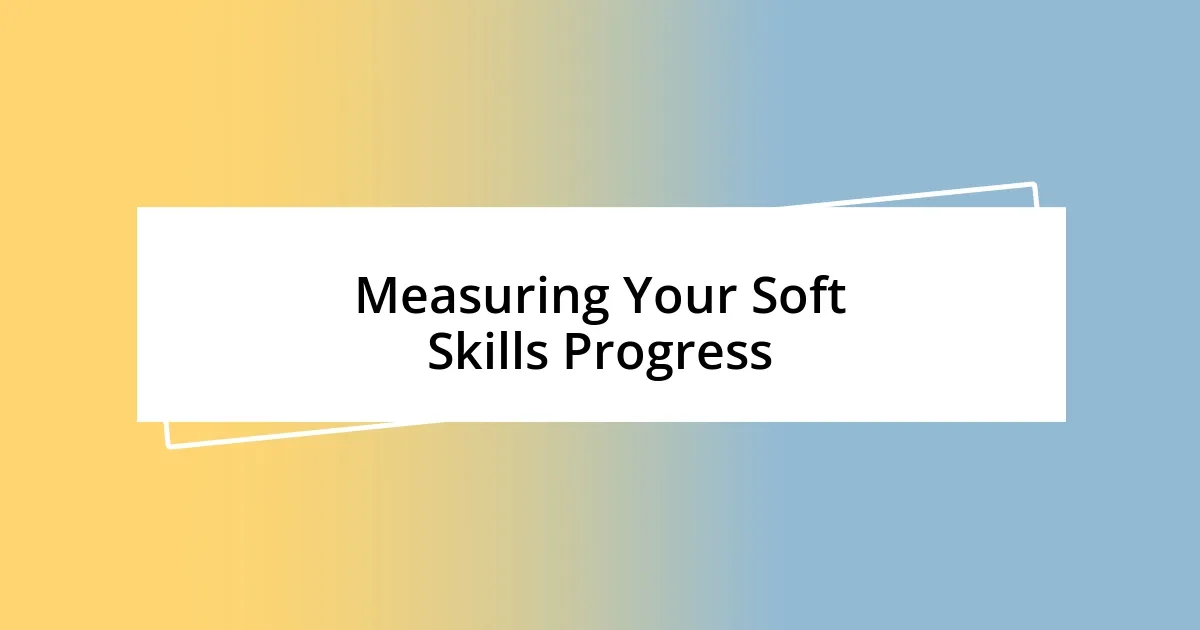
Measuring Your Soft Skills Progress
Measuring progress in soft skills can feel elusive, but I’ve found that setting specific, actionable goals is crucial. For example, I once aimed to improve my active listening skills over a month. Each week, I recorded instances where I consciously engaged in conversations, summarizing what others said and asking follow-up questions. This not only helped me reflect on my growth but also reinforced my commitment to truly hearing my colleagues.
I also believe in seeking feedback from peers as a powerful tool to gauge my soft skills. After a team meeting, I started inviting a few trusted colleagues to share their observations about my contributions. Their insights not only illuminated areas I needed to work on but also boosted my confidence when they noted improvements. Have you ever considered how valuable external perspectives can be in your own growth journey?
Another method I’ve embraced is self-reflection through journaling. At the end of each week, I jot down experiences related to collaboration and conflict resolution. By noting my feelings and reactions, I can identify patterns—like times when my tone may have unintentionally come across as harsh. This practice fosters self-awareness and clarity, leading to more intentional interactions. How often do you take a moment to reflect on your own behavior and its impact on others?
